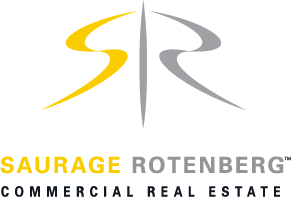Article by Jim Allen, Commercial Investment Specialist for Saurage Rotenberg Commercial Real EstateCommercial real estate loan is a general term used to describe types of credit facilities. Commercial real estate loans generally include 1) facilities secured by income-producing property, 2) those secured by owner-occupied property (the current sweet spot) and 3) commercial loans using real estate as additional collateral (loans not used to purchase the real estate).
Basic commercial lending guidelines apply to commercial real estate loans. The Borrower should have skin in the game. There should be at least two sources of repayment and the primary sources should be cash flow from the project. The loan purpose and repayment should be connected.
Typically the primary and secondary source of repayment are co-dependent. For example, if the primary source of repayment is cash flow from a leased real estate project and the secondary source is liquidating the real estate; poor cash flow from the property may diminish the liquidation value of the collateral. No property is free of market volatility risk.
Prudent lenders rely on a pool of resources to “backstop” a loan, assuring loan performance. Recourse, guaranties and borrowing structure are important resources to support financing and add value to a loan facility.
INCOME PRODUCING PROPERTY
Loans for construction, acquisition, or refinance of investment property that generates rental cash flow are income property loans. The Borrower’s return on investment results from profitable collection of rents and from rising real estate values fostered by rising rents. Future fluctuations in rents is usually outside the control of the owner.
Some banks prefer the front end construction loan because of higher return based on risk compared to theperceived illiquidity and interest rate risk of term financing. Other lenders prefer term financing because the loans can be batched and sold to provide liquidity and because of the steady stream of income and low maintenance cost to maintain the portfolio.
When lenders underwrite a loan for income-producing property, the underlying value is in “cash flow”. Loans are repaid by cash. The income stream should be predictable and stable. Lenders will evaluate the lease, the tenant and the market.
OWNER OCCUPIED PROPERTY
Lenders are usually more comfortable with an owner occupied loan because the borrower has a vested interest and usually the cash flow is more predictable and certain. The lender will look at the last three or four years of financial performance; the projected cash flow, leverage and profitability; management; and industry forecasts.
COMMERCIAL LOANS SECURED BY REAL ESTATE
These commercial loans require real estate be pledged to a non-real estate or other real estate facility. The purpose of the collateral is to enhance the lender’s recovery prospects and to create a psychological commitment by the Borrower. The real estate may add collateral value and additional cash flow.
Lenders look at these three types of loans with different criteria. It is important for a realtor or a borrower to bring the best loan package to the table. The borrower should look at the package with the eyes of the lender.
To view Saurage Rotenberg Commercial Real Estate’s Featured Property, click HERE.
Jim Allen earned his bachelor’s degree from Baylor University in Waco, Texas and his masters from Louisiana State University. In addition to his multiple degrees he has taken numerous coursework in banking, marketing, accounting, and business law. As a complement to his sales experience, Jim also has 25 years experience in commercial real estate financing.
Saurage Rotenberg Commercial Real Estate is a member of the Baton Rouge Area Chamber of Commerce (BRAC); the West Baton Rouge Chamber of Commerce; the Baton Rouge Growth Coalition; the Baton Rouge Better Business Bureau; the Louisiana Commercial Data Base (LACDB); and the International Council of Shopping Centers (ICSC). Several agents, on an individual basis, are members of the Society of Industrial and Office Realtors® (SIOR), the Certified Commercial Investment Member Institute (CCIM); the National Association of REALTORS® (NAR); and the Greater Baton Rouge Association of REALTORS® Commercial Investment Division (CID).


